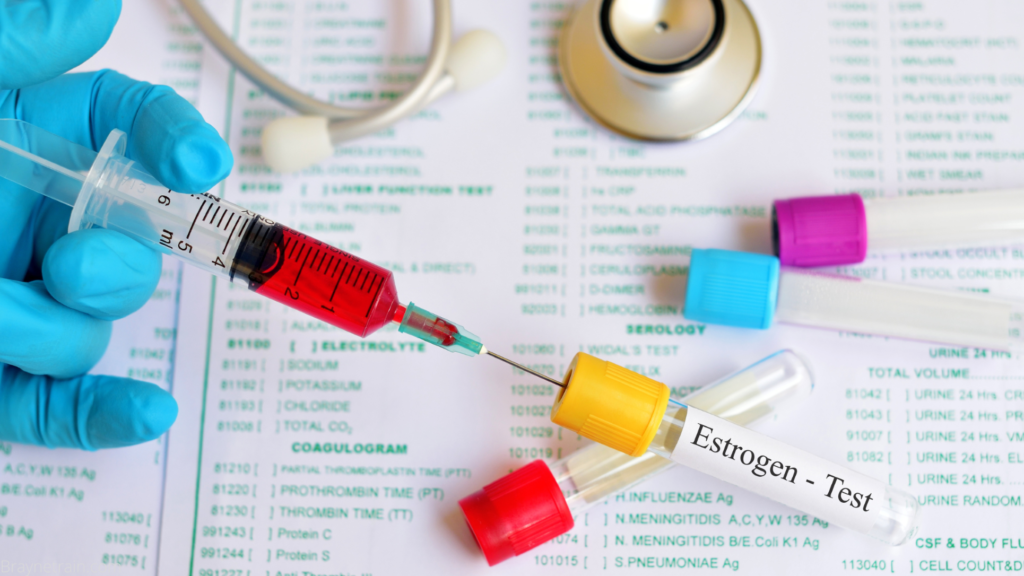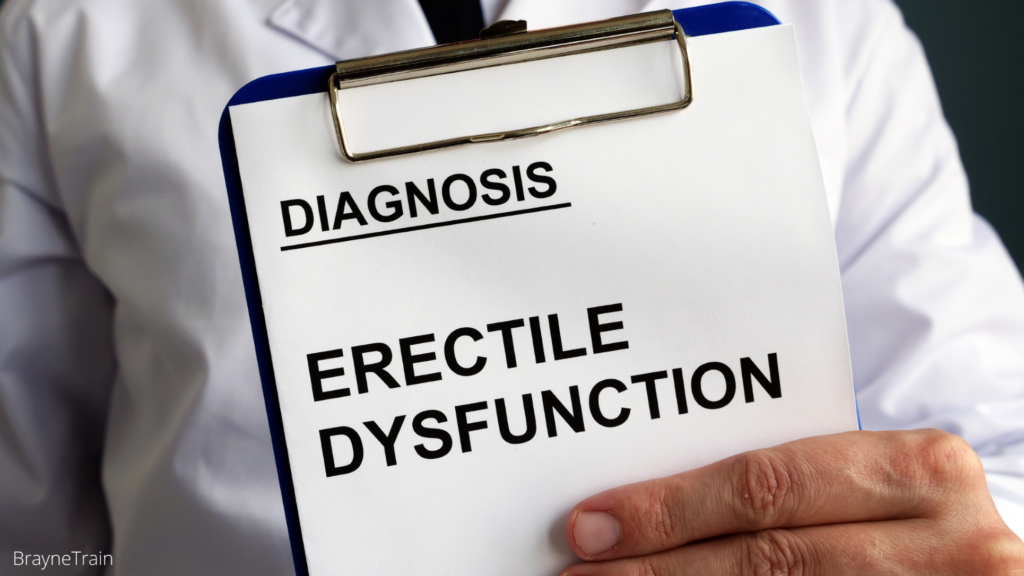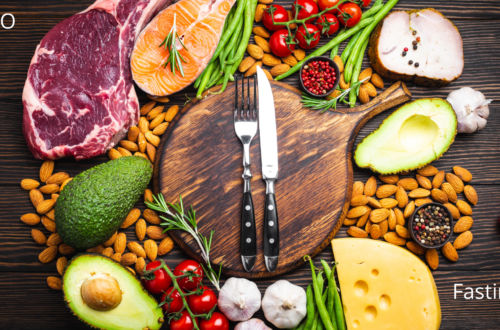
Estrogen Dominance & Weight Gain; how to prevent it!
Estrogen dominance can lead to fat gain and it can make losing weight much more difficult than it should be.
Estrogen is the hormone responsible for developing and regulating the female reproductive system and secondary sex characteristics. While estrogen is essential for overall health, too much of it can cause problems.
Although it is commonly associated with women, both men and women have estrogen and can suffer from estrogen dominance.
If you’re struggling to lose weight, it’s worth considering extra estrogen might be the issue.
To learn more about estrogen dominance and how you can prevent it, continue reading!

Common Symptoms of Estrogen Dominance:
- Weight gain
- Bloating
- Inflammation
- Bad memory & brain fog
- Anxiety
- Mammary tissue changes (PCOS, etc.)
- Painful, irregular periods
- Acne
- Depression
- Mood Swings
- Irritability
- Vaginal dryness
- Heavy periods
- Low sex drive
- Headaches & migraines
- Hair loss
- Cold hands and feet
- Sleep Imbalance
To learn more about ways you can reduce your anxiety, click here.

Estrogen Dominance in Men:
Most people associate estrogen with women, but the truth is both men and women produce estrogen.
In fact, estrogen is essential for the reproductive health of both sexes.
When estrogen levels are too high in men, it can lead to various health problems.
Common symptoms of Estrogen Dominance in men:
Gynecomastia
The development of enlarged breasts in men is most often caused by a hormonal imbalance such as estrogen dominance.
In particular, it is often the result of estrogen dominance or an excess of estrogen in relation to other hormones.
Estrogen dominance in men can be caused by several factors, including puberty issues, certain medications, and obesity.
While it is not a severe medical condition, gynecomastia can be uncomfortable and embarrassing for those affected by it.
There are a variety of treatments available, including surgery, hormone therapy, and dietary changes.
However, the most effective approach will vary depending on the individual case.
Infertility
One of the causes of infertility in men is hormonal imbalance, specifically estrogen dominance.
When estrogen levels are too high, it can interfere with sperm production and motility, making it difficult for men to conceive.
Estrogen dominance can also cause erectile dysfunction and low libido.

Erectile Dysfunction
(ED) is a common problem in men, and hormonal imbalance is one of the most common causes.
When there is an imbalance between testosterone and estrogen levels, it can lead to erectile dysfunction.
Too much estrogen in the body can cause problems with blood flow, which can make it challenging to get and maintain an erection.
Estrogen dominance can be caused by several factors, including aging, obesity, and certain medications.

How to Treat Estrogen Dominance Naturally.
While medication or surgery can often help treat the underlying causes of hormonal imbalance, making dietary changes can also play a significant role in managing the condition.
Intermittent Fasting
Intermittent fasting is a powerful tool that can help correct hormonal imbalances and helps treat estrogen dominance.
By reducing the amount of time you eat every day, you give your body a chance to rest, restore balance, and reset itself, which results in balancing the hormones.
Fasting lowers insulin levels, insulin is one of the main hormones which contribute to overall hormonal balance in the bodies of both men and women.
Intermittent fasting has been shown to help improve estrogen metabolism, making it an effective treatment for estrogen dominance.
In addition, intermittent fasting can help reduce inflammation, which is another factor that can contribute to hormonal imbalance.
To learn more about insulin resistance and how to reverse it, click here.

Ketogenic Diet
A ketogenic diet has been shown to help lower insulin levels in the body, and this can help correct hormonal imbalances.
Studies have shown that PCOS, or polycystic ovarian syndrome, can be improved by following a ketogenic diet.
PCOS is characterized by high insulin and estrogen levels and low progesterone levels. This hormonal imbalance can lead to various symptoms, including irregular periods, weight gain, fertility problems, and acne.
By lowering insulin levels with a keto diet, you can help restore balance to your hormones, which can alleviate these symptoms.

Which Foods can result in estrogen dominance?
Avoiding certain foods can help treat estrogen dominance.
- Soy & soy-processed food
- Soy is a common ingredient in food, but it has come under scrutiny in recent years for its potential to cause hormonal imbalances.
- One of the main ways soy can impact hormones is by causing estrogen levels to rise.
- Non-organic vegetables
- Non-organic vegetables are often sprayed with pesticides and other chemicals that can disrupt the hormonal balance in your body.
- Meat with extra hormones
- One potential source of hormonal imbalances is meat treated with hormones.
- These hormones can enter the bloodstream and disrupt the delicate balance of hormones in the body.

What to eat to improve estrogen dominance:
Consuming foods rich in indoles and flavonoids can help regulate estrogen production in the body. They can also help reduce the amount of estrogen stored in fat cells.
Indoles and Flavonoids Rich foods:
- Cabbage
- Cauliflower
- Broccoli
- Garlic
- Onion
- Brussel Sprouts
- Radish
- Kale
Takeaway
If you are experiencing symptoms of estrogen dominance, we recommend trying the tips listed in this blog post. Fasting, following a ketogenic diet, and avoiding soy-based foods are all great ways to help improve your symptoms.
Additionally, eating healthy organic vegetables and avoiding meat treated with hormones can also be beneficial. Thank you for reading!
References:
Marquardt RM, Kim TH, Shin JH, Jeong JW. Progesterone and Estrogen Signaling in the Endometrium: What Goes Wrong in Endometriosis? Int J Mol Sci. 2019 Aug 5;20(15):3822. doi: 10.3390/ijms20153822. PMID: 31387263; PMCID: PMC6695957.
Mavropoulos JC, Yancy WS, Hepburn J, Westman EC. The effects of a low-carbohydrate, ketogenic diet on the polycystic ovary syndrome: a pilot study. Nutr Metab (Lond). 2005;2:35. Published 2005 Dec 16. doi:10.1186/1743-7075-2-35
Ho KY, Veldhuis JD, Johnson ML, et al. Fasting enhances growth hormone secretion and amplifies the complex rhythms of growth hormone secretion in man. J Clin Invest. 1988;81(4):968-975. doi:10.1172/JCI113450




